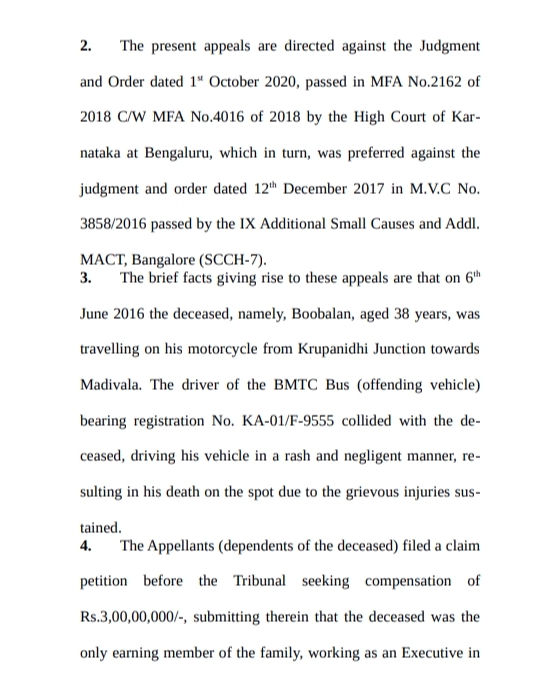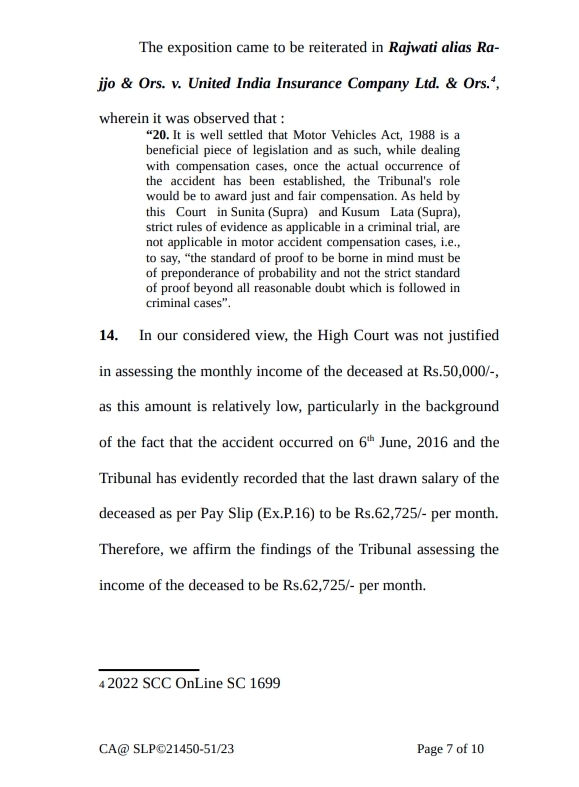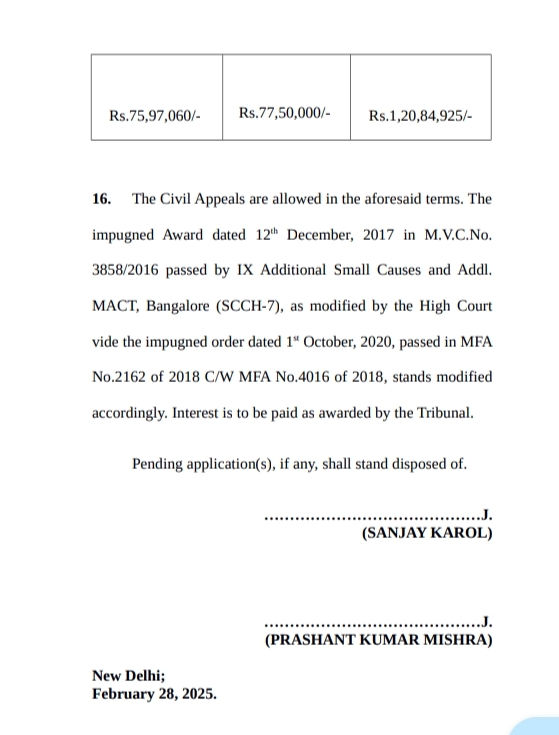Motor Accident Case: Contributory Negligence and Compensation.
- M.R Mishra

- Mar 1, 2025
- 3 min read
In a significant judgment delivered on February 28, 2025, the Supreme Court of India addressed critical issues surrounding contributory negligence and compensation in motor accident cases. The case, Prabhavati & Ors. v. The Managing Director, Bangalore Metropolitan Transport Corporation, has set a precedent for how courts should assess negligence and calculate compensation in fatal road accidents.
What's The Matter?
The case arose from a tragic road accident that occurred on June 6, 2016, in Bengaluru. The deceased, Boobalan, a 38-year-old executive in the housekeeping department at Hotel Royal Orchid, was riding his motorcycle when he collided with a BMTC bus . The accident resulted in Boobalan’s death on the spot due to grievous injuries. The driver of the BMTC bus was alleged to have been driving in a rash and negligent manner.

The dependents of the deceased (the appellants) filed a claim petition before the Motor Accident Claims Tribunal (MACT), seeking compensation of Rs. 3 crore. They argued that Boobalan was the sole earning member of the family, with a monthly income of Rs. 70,000. The MACT, after considering the evidence, awarded Rs. 75,97,060 with 9% interest, holding the BMTC bus driver solely responsible for the accident.
However, both parties were dissatisfied with the MACT’s decision. The appellants challenged the income assessment, while the respondent (BMTC) contested the finding of negligence and the interest rate. The High Court of Karnataka modified the MACT’s order, introducing contributory negligence at 25% on the deceased and 75% on the bus driver. It also reduced the monthly income assessment to Rs. 50,000 and awarded Rs. 77,50,000 with 6% interest.
The appellants then approached the Supreme Court, challenging the High Court’s decision, particularly the contributory negligence finding and the income assessment.
What Happened in Court?
The Supreme Court reviewed three key issues in the case: contributory negligence, income assessment, and compensation calculation. On the issue of contributory negligence, the Court disagreed with the High Court’s finding that the deceased was 25% negligent.
It found no direct or corroborative evidence to suggest negligence on the part of the deceased, relying on the Spot Mahazar (Ex. P3) and witness testimony (P.W.1).
Citing precedents like Jiju Kuruvila v. Kunjujamma Mohan and Kumari Kiran v. Sajjan Singh, the Court emphasized that contributory negligence cannot be presumed in the absence of clear evidence.

The Court concluded that the BMTC bus driver’s rash and negligent driving was solely responsible for the accident. Regarding income assessment, the Supreme Court overturned the High Court’s decision to reduce the deceased’s monthly income to Rs. 50,000, reaffirming the Tribunal’s assessment based on the last drawn salary of Rs. 62,725 (as per Ex. P.16).
The Court reiterated that motor accident cases follow the standard of preponderance of probability rather than strict criminal standards, as established in various cases
The reduction of income by the High Court was deemed unjustified, given the deceased’s stable employment and documented salary.
In recalculating the compensation, the Supreme Court applied a monthly income of Rs. 62,725, added a 40% increase for future prospects, deducted one-fourth for personal expenses, and used a multiplier of 15 based on the deceased’s age (38 years). Additional non-pecuniary damages, including loss of estate, funeral expenses, and loss of consortium, were also factored in.
The final compensation awarded was Rs. 1,20,84,925, significantly higher than the amounts awarded by both the MACT and the High Court.
The judgment established important legal principles, including the requirement for concrete evidence to prove contributory negligence, the reliance on documentary evidence like pay slips for income assessment, and the proper application of future prospects, deductions, and multipliers as per National Insurance Co. Ltd. v. Pranay Sethi.
Also Read Latest Judgements: https://www.mrmlxp.in/post/mv-compensation-interest-on-delayed-payments-is-non-negotiable

The Prabhavati case is a landmark judgment that reinforces the principles of contributory negligence and fair compensation in motor accident claims. By overturning the High Court’s findings and awarding enhanced compensation, the Supreme Court has ensured justice for accident victims' dependents. This ruling serves as a guiding precedent, emphasizing evidence-based decisions and timely justice.







Comments